| Trinity Foundation | The Wittenburg Door |
THE PROSPERITY GOSPEL
TBN's Promise: Send Money and See Riches
Reprinted from the Los Angeles Times September 20, 2004.Trinity Foundation furnished substantial investigative data for this story.
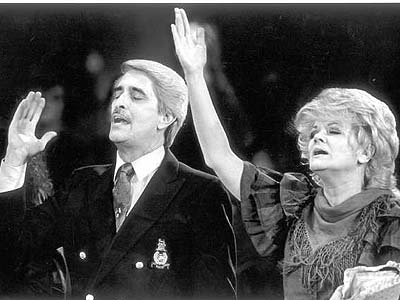 Paul and Jan Crouch sing at a 1988 revival meeting at the Cathedral of Light in Selma. His salary is $403,700 a year; his wife's is $361,000. Their perks include a TBN-owned jet. (Mark Boster / LAT)
| |||
Times Staff Writer
September 20, 2004
Pastor Paul Crouch calls it "God's economy of giving," and here is how it works:
People who donate to Crouch's Trinity Broadcasting Network will reap financial blessings from a grateful God. The more they give TBN, the more he will give them.
Being broke or in debt is no excuse not to write a check. In fact, it's an ideal opportunity. For God is especially generous to those who give when they can least afford it.
"He'll give you thousands, hundreds of thousands," Crouch told his viewers during a telethon last November. "He'll give millions and billions of dollars."
Preachers who pass the hat while praising the Lord have long been the stuff of ridicule in film and fiction. But for Crouch and his Orange County-based television ministry, God's economy of giving is no laughing matter. It brings a rich bounty, year after year.
Crouch has used a doctrine called the "prosperity gospel" to underwrite a worldwide broadcasting network and a life of luxury for himself and his family.
For at least a century, preachers have plied the notion that dropping money in the collection plate will bring blessings from God — material as well as spiritual. But Crouch, through inspired salesmanship and advanced telecommunications technology, has converted this timeworn creed into a potent financial engine.
TBN collects more than $120 million a year from viewers of its Christian programming — more than any other TV ministry. Those donations have fueled its rise from a rented studio in Santa Ana to a global broadcasting system whose programs appear on thousands of channels — via satellite, cable and over-the-air broadcasts — in a dozen languages.
The network's donors also help fund generous salaries for Crouch ($403,700 a year) and his wife, Jan ($361,000), and an array of perks, including a TBN-owned jet and 30 homes across the country, among them a pair of Newport Beach mansions and a ranch in Texas.
The prosperity gospel is rooted in the idea that God wants Christians to prosper and that believers have the right to ask him for financial gifts. TBN has woven this notion into its round-the-clock programming as well as the thousands of fund-raising letters it mails every day.
During one telethon, Crouch, 70, told viewers that if they did their part to advance the Kingdom of God — such as by donating money to TBN — they should not be shy about asking God for a reward.
"If my heart really, honestly desires a nice Cadillac … would there be something terribly wrong with me saying, 'Lord, it is the desire of my heart to have a nice car … and I'll use it for your glory?' " Crouch asked. "I think I could do that and in time, as I walked in obedience with God, I believe I'd have it."
Other preachers who appear on the network offer variations on the theme that God appreciates wealth and likes to share it. One of them, John Avanzini, once told viewers that Jesus, despite his humble image, was a man of means.
"John 19 tells us that Jesus wore designer clothes," Avanzini said, referring to the purple robe that Christ's tormentors wrapped around him before the Crucifixion. "I mean, you didn't get the stuff he wore off the rack…. No, this was custom stuff. It was the kind of garment that kings and rich merchants wore."
TBN viewers are told that if they don't reap a windfall despite their donations, they must be doing something to "block God's blessing" — most likely, not giving enough.
Crouch has particularly stern words for those who are not giving at all.
"If you have been healed or saved or blessed through TBN and have not contributed … you are robbing God and will lose your reward in heaven," he said during a 1997 telecast.
A central element of the prosperity gospel is that no one is too poor or too indebted to donate. Bishop Clarence McClendon, a preacher whose show "Take It By Force" appears on TBN, told viewers in March that God had asked him to deliver a message to those in financial difficulty:
They should "sow a seed" by using their credit cards to make donations. In return, the Lord would see to it that the balances would be paid off within 30 days.
"Get Jesus on that credit card!" McClendon said.
Ask and Receive
Proponents of the prosperity gospel — also known as the "name it and claim it" gospel and the "health and wealth" gospel — point to a verse in the Hebrew Scriptures in which the Lord warns the faithful not to "rob" him by withholding their tithes:
" 'Test me in this,' says the Lord Almighty, 'and see if I will not throw open the floodgates of heaven and pour out so much blessing that you will not have room enough for it.' "
E.W. Kenyon, an evangelical pastor in the first half of the 20th century, was an early and influential advocate of the idea that God would grant material wishes.
Kenyon wrote about the "power of faith" to bring health and wealth. He depicted an Almighty who not only protected his followers and forgave their sins, but handed out gifts if asked. The important thing was to ask.
Kenyon's ideas inspired what came to be known as the Word of Faith movement. Many of the phrases Kenyon coined — such as "What I confess, I possess" — are still used by evangelists.
After Kenyon's death in 1948, other pastors used aspects of his teachings to draw an even more emphatic connection between piety and prosperity. Pentecostalists such as Oral Roberts were particularly ardent in espousing this doctrine.
In the 1960s, Pastor Kenneth Hagin, often described as the father of the Word of Faith movement, raised the profile of the prosperity gospel still further, promoting it on television and in books with titles such as "Godliness Is Profitable" and "How to Write Your Own Ticket with God."
Hagin preached a four-part formula that he said he received in a vision from Jesus: Say it. Do it. Receive it. Tell it.
First, believers must ask God for what they want. Next, they must demonstrate their faith through donations. Then they will tap into the "powerhouse of heaven" and receive their gifts. Finally, they must spread the news.
Most of today's leading televangelists preach some version of this creed.
Paul and Jan Crouch were brought up in the Assemblies of God, a Pentecostal denomination where the prosperity gospel flourishes. After working in ministries in South Dakota and Michigan, the couple moved to Southern California in 1961 to run an Assemblies of God TV production facility in Burbank.
They launched their own network in 1973. After two nights on the air on KBSA-TV Channel 46 in Santa Ana, they were broke. So the next night, they staged a telethon.
The phones hardly rang. Then Paul Crouch hit on an idea, he recalled in his autobiography, "Hello World!" He told Jan to announce on the air that an anonymous donor had promised to give $20,000 — on condition that viewers pledge the same amount that night.
The anonymous donor was Crouch, and the $20,000 was money the couple had already lent the network. If viewers came through with $20,000, they would forgo repayment of the loan.
By evening's end, viewers had phoned in $30,000 in pledges, enough to keep TBN on the air.
"Without really realizing it at the time, I had put into motion one of God's most powerful laws — the law of giving and receiving, sowing and reaping," Crouch wrote. "Thirty-, 60- and 100-fold blessing is, indeed, a glorious truth and blessing for those who will simply obey the word of the Lord!"
The prosperity gospel became the foundation of TBN fundraising. The Crouches and TBN personalities such as faith healer Benny Hinn present the doctrine with passion and a flair for the dramatic.
During fundraising "Praise-a-thons," the Crouches read testimonials from donors whose debts supposedly were miraculously forgiven — or who inexplicably received checks in the mail. They pray over donors' pledge cards.
In 2000, TBN televangelists told viewers that those who promised $2,000 would get the money back before the end of the year — and would find that their debts had been canceled. Later, donors were invited to send in loan statements and other debt paperwork. The documents were burned on a stone altar.
During another pitch, Crouch read on camera a letter he said was from a financially strapped viewer who had pledged $4,000.
According to Crouch, the donor wrote: "Within 15 minutes of that time, I received a check in the U.S. mail in the amount of $5,496.70. No explanation…. I know it's not an income tax return. I don't make enough money to file returns."
That year, in a fundraising letter to the network's "prayer partners," Crouch wrote: "Praise the Lord, the reports of awesome miracles of debts canceled and God's people coming out of debt continue to come in. God's economy of giving really works!"
What Windfall?
Most mainstream theologians and pastors say the prosperity gospel is at best a doctrinal error and at worst a con game. They point out that Jesus and his disciples abandoned their possessions in order to live a spiritually rich life.
"It is difficult to fathom how anyone familiar with the abundance of biblical teaching about the 'deceitfulness of riches' could have devised the prosperity gospel," said William Martin, a sociology professor at Rice University and author of a biography of Billy Graham.
"While the Bible does not condemn all wealth, it surely points to its dangers in numerous passages."
Critics of TBN say that the promise of financial miracles — besides being a distraction from the core principles of Christianity — can cause real harm.
Ole E. Anthony, founder of the Trinity Foundation in Dallas, a televangelist watchdog, said he knew people who had given the last of their savings to TV preachers, hoping for a windfall that never came.
"The people on TBN are living the lifestyle of fabulous wealth on the backs of the poorest and most desperate people in our society," Anthony said. "People have lost their faith in God because they believe they weren't worthy after not receiving their financial blessing."
Thomas D. Horne, of Williford, Ark., a disabled Vietnam-era veteran, said that in 1994 he was swept away by the rhetoric of TBN pastors and donated about $6,000 in disability benefits.
Time went by and he did not receive the promised surfeit of money. Last year, he found out that TBN had purchased a Newport Beach mansion overlooking the Pacific. He wrote to the network, asking for his money back.
"I want to recoup my hard-earned disability money I sent to these despicable people," said Horne. He said he has received no reply.
Philip McPeake is another donor for whom God's economy of giving did not deliver. Out of work and out of luck in November 1998, McPeake heard the Rev. R.W. Schambach make an impassioned plea for donations on TBN's Kansas City television station, KTAJ.
Schambach promised that if viewers sent $200 as a down payment on a $2,000 pledge, God would give them the rest within 90 days — with a bonus to follow.
McPeake sent in his money and waited for his luck to change. When it didn't, he complained to the Missouri state attorney general's office and the Federal Communications Commission. TBN refunded his donation.
Carl Geisendorfer, who runs a low-power Christian television station in Quincy, Ill., offered TBN programming for 19 years — until, he said, he grew disgusted by the televangelists' financial appeals.
He said he pulled TBN off the air in 2002 after watching a preacher tell viewers that they should pledge $2,000 — even if they didn't have it — in order to receive a financial miracle from God.
"I should have canceled TBN several years earlier, but I thought Paul Crouch would finally see the light on how foolish and prideful that false gospel is," said Geisendorfer, president of Believer's Broadcasting Corp., a small media group. "I'm sorry I waited as long as I did."
Geisendorfer said donations to his station dropped 25% after he dropped TBN's programs. He said Paul Crouch called him and, during a 90-minute conversation, admitted to struggling over how far to go in promising financial rewards to donors.
"He said, 'What's the difference if some believe it or not. It works for many people. Why not?' " Geisendorfer wrote in a newsletter sent to station supporters last year. He quoted Crouch as saying: "The money comes in and the world is being reached by the Gospel."
Crouch declined to be interviewed for this article. His son, Paul Crouch Jr., a TBN executive, said critics of the prosperity gospel overlook the fact that the network has used viewers' contributions to bring God's word to millions of people.
He said it was unfortunate that "the prosperity gospel is a lightning rod for the Body of Christ. It's not what drives TBN."
If TBN was interested only in money, the younger Crouch said, it would sell advertisements instead of funding its operations primarily with viewers' contributions.
"We could double our money tomorrow," he said.
He added that appeals for money make up a small part of TBN programming and are prominent mainly during TBN's twice-yearly, weeklong "Praise-a-thons."
Those are the times when Rick Johnston, a retired pastor who lives near Flagstaff, Ariz., swings into action.
Johnston, 56, organizes groups of like-minded Christians to try to jam TBN's phone lines during "Praise-a-thons." The strategy is to stay on the line as long as possible offering phony pledges.
"I feel like a little fly trying to knock down Goliath," Johnston said. "But if I can stop somebody from being robbed of $100, I'm going to do it. There are worse things in life I could be guilty of doing."
Not all TBN donors are looking for a financial payback. Many say they are more interested in the promise of salvation and in helping spread the message of Jesus.
Jeanne Fish, 87, a widow who lives in a Tustin apartment, said she took solace from TBN when her husband died nearly 20 years ago and has been a loyal viewer ever since.
"I get so much out of it," she said. "It's almost like getting a theology degree. It's kind of hard to turn off, in fact."
Loyal viewers are dumbfounded that TBN generates controversy within the evangelical community.
"I'm just so amazed and shocked that so many people don't like [TBN] in the Christian world," said Arthur Robbins, an artist who lives near Santa Cruz. "It's a huge undertaking to promote the Gospel worldwide, and they're doing it."
On the air, Paul Crouch responds to criticism of the prosperity gospel by invoking Satan.
"If the devil can keep all of us Christians poor, we won't have any disposable income to build Christian television stations," Crouch said once.
Michael Giuliano, an expert in televangelism at Westmont College in Santa Barbara, said this is an effective strategy.
"It's very, very powerful," he said. "In a world of uncertainty, you know who the good guys in the white hats are and who the guys in the black hats are. And giving money to TBN is a tangible way to join the fight for the good guys."
`Get Jesus on that credit card!'
| Pastor Paul Crouch and other evangelists appearing on Trinity
Broadcasting Network tell viewers that God will reward them many
times over for their donations. Examples: Paul Crouch 'God spoke to me clearly and said, "Did I give my son Jesus on the cross expecting nothing in return?" God bankrupted heaven and gave the best gift he could give…. You can bring God a gift fully expecting something in return. Get to the phone!' 'Have you got something that you have been praying about 10, 15, 20 years? You have been praying for it and haven't gotten it…. It could be that you haven't gotten it because you are a tightwad and you haven't given your 10%.' 'People ask me sometimes, "I have been asking from God and not receiving anything." I have to ask them some hard questions: Are you giving anything?'
'God gave his best at Calvary. He told me, "Don't you dare come before me if you don't give your best!" ' 'To reap a perpetual harvest you need to sow a perpetual seed. I got a need for seed.'
'Some of you are wrestling with debt that you cannot pay off. God told me this morning to tell you to … sow a seed on the credit card that you want God to pay off…. Get Jesus on that credit card! Make a pledge on that credit card!' |
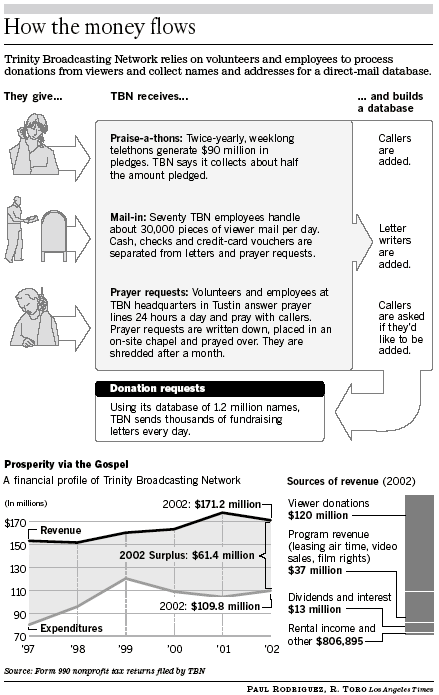
A Challenge to TBN Growth
The FCC once ruled that a minority-owned company was a scheme to acquire more stations.
By William LobdellTimes Staff Writer
September 20, 2004
Televangelist Paul Crouch often blames Satan for the difficulties he encountered building Trinity Broadcasting Network into the world's largest Christian broadcaster.
But the most serious challenge TBN has faced was from an earthly source: the Federal Communications Commission.
In 1995, the agency ruled that Crouch had created a "sham" minority company to circumvent limits on the number of television stations his network could own.
Crouch told viewers that the ruling, if allowed to stand, would prevent TBN from acquiring two new stations and, worse, would jeopardize the station licenses it already held.
"The whole network was ultimately on the line," he wrote in his autobiography, "Hello World!"
The controversy centered on National Minority TV, a company created by TBN to buy television stations. TBN itself owned the maximum number then allowed by federal rules — 12.
In 1993, National Minority TV asked the FCC to renew the license of a station it owned in Miami. Advocacy groups complained that the company was a mere front for Crouch and asked the agency not to renew the license.
National Minority TV was run by a three-member board of directors: Crouch; his former administrative assistant, Jane Duff, an African American; and David Espinosa, a Latino pastor.
"So we had it — a minority-controlled board, two to one!" wrote Crouch.
In 1995, an FCC judge ruled that National Minority TV was not minority-controlled but rather was a "sham" by which Crouch had tried to sidestep the ownership limit.
Crouch appealed to the five-member FCC board. He also began negotiating with the advocacy groups, offering them a monetary settlement to drop their challenge.
Crouch turned to TBN viewers for money.
A five-night telethon elicited $65 million in pledges. Crouch offered that sum as a settlement, and the advocacy groups agreed to accept it.
In 1999, however, the FCC rejected the settlement and refused to renew National Minority TV's license for the Miami station.
It said TBN's claim that the company was minority-controlled "was at best doubtful and at worst false."
Crouch appealed to the U.S. Court of Appeals for the District of Columbia Circuit and won. The court ruled in 2000 that federal rules on minority broadcasting companies were unclear and that TBN "may not be punished."
Congress later raised the limit on station ownership. TBN now owns 23 full-power stations around the country.
Crouch said God was responsible for the happy outcome: "He never loses a case!"
| Trinity Foundation | The Wittenburg Door |

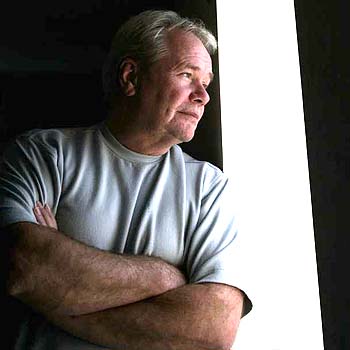
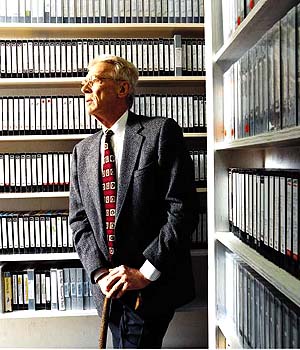
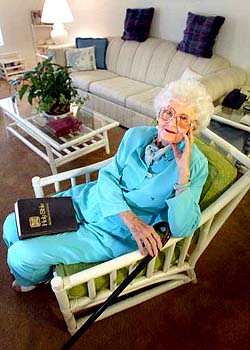
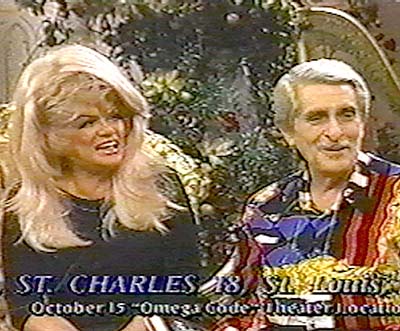
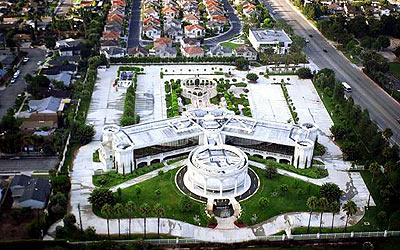
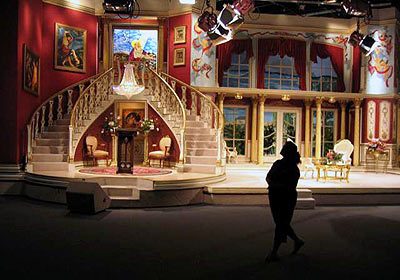
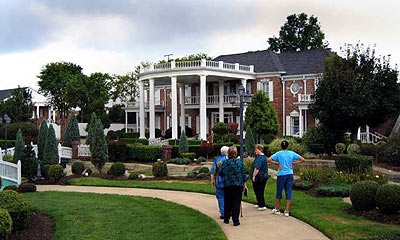
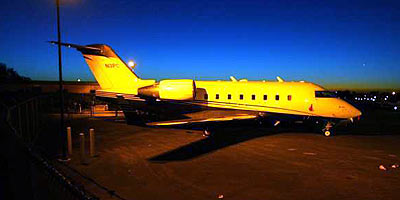
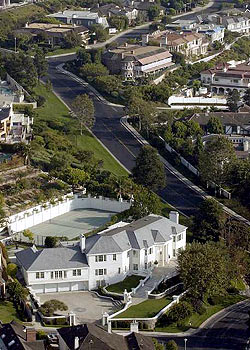
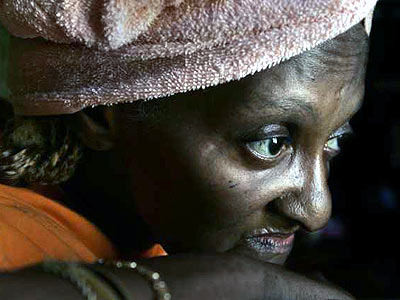
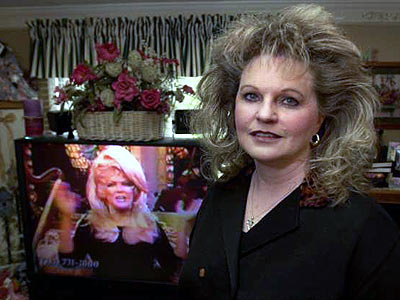 Kelly
Whitmore, who worked at TBN from 1992 to 1997, said the Crouches
indulge expensive tastes at their donors' expense.
Kelly
Whitmore, who worked at TBN from 1992 to 1997, said the Crouches
indulge expensive tastes at their donors' expense.